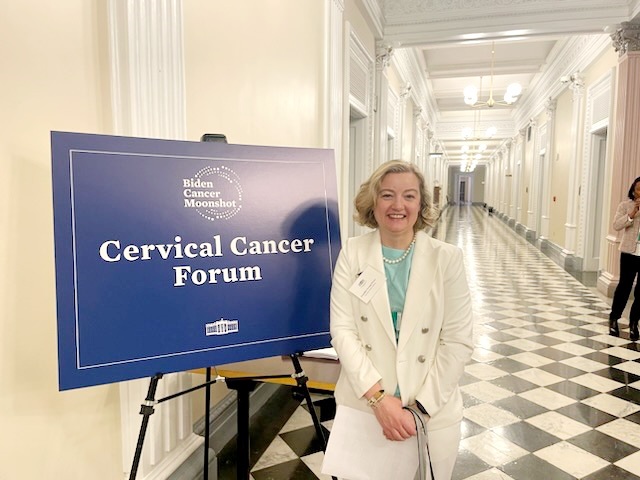USA Health oncologist praises national initiative studying self-collection for cervical cancer screening
MOBILE, Ala. – A GYN oncologist at the USA Health Mitchell Cancer Institute called a new HPV testing study involving self-collection “the most important work we do in cervical cancer in this generation.”
Jennifer Young Pierce, M.D., M.P.H., a gynecologic oncologist and director of the Division of Cancer Control and Prevention at the MCI, attended the White House Cervical Cancer Forum on Thursday in Washington, D.C., where a national network to study self-collection of vaginal samples was announced.
“This initiative will be the most important work we do in cervical cancer in this generation,” Pierce said. “The previous generation of scientists gave us the science and, ultimately, the HPV vaccine. This initiative gives us the tools to see that every case of cervical cancer is prevented.”
An estimated 13,000 women in the U.S. will be diagnosed with cervical cancer this year. Caused by HPV, cervical cancer is highly preventable through HPV vaccination, and early detection and treatment of cervical precancerous changes. Yet, more than half of all cases of cervical cancer diagnosed in the U.S. occur in individuals who have never been screened or who are screened infrequently.
Announced at the forum, the Self Collection for HPV Testing to Improve Cervical Cancer Prevention (SHIP) Trial Network will study the clinical performance of HPV testing that utilizes self-collection methods being evaluated by the FDA. The SHIP network is supported by the National Cancer Institute’s Cervical Cancer “Last Mile” Initiative and has the potential to add self-collection as a screening tool to reach underserved and under-screened individuals.
The current standard for cervical cancer screening involves a pap test and test for HPV, with specimens collected during a pelvic exam in the clinical setting. As an alternative, individuals could collect vaginal samples at home and send them in for HPV testing. Self-collection could also be offered during other healthcare visits when a pelvic examination is not practical or not preferred, the NCI said.
Pierce said she is hopeful the study will eventually lead to more women getting screened for HPV. “The biggest impact will be in rural areas where women have difficulty getting to a doctor’s office to receive screening,” Pierce said. “Our hope is that this will end disparities and improve equity across Alabama.”
For more information about cervical cancer and the Mitchell Cancer Institute’s GO Teal and White campaign for cervical cancer awareness, visit http://www.healthsystem.com/go-teal-and-white.
About the Mitchell Cancer Institute
The USA Health Mitchell Cancer Institute stands as the only academic cancer treatment and research facility along the upper Gulf Coast. Continuous research and technological advancements keep the MCI at the forefront of cancer treatment and outcomes. Providers and staff are dedicated to bringing the most advanced care to people in the region, including having available clinical trials that are the steppingstones to widespread treatment options.

Stay Connected
Fill out and submit the form below to get regular updates from Mobile Chamber delivered directly to your inbox.






